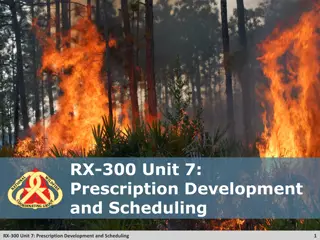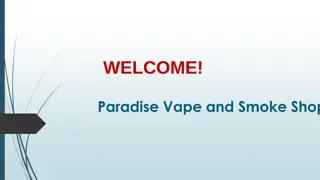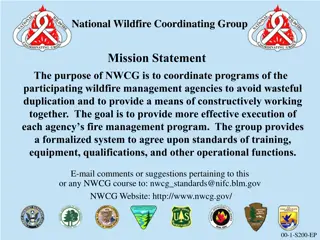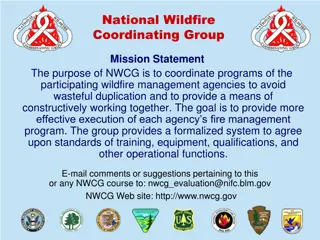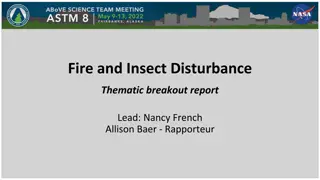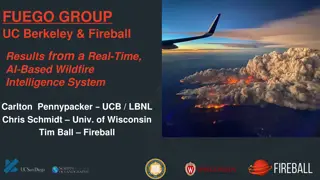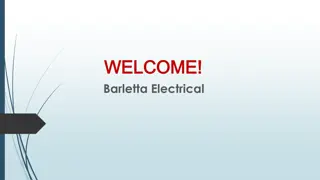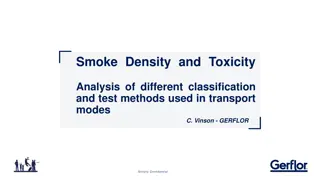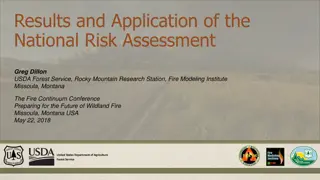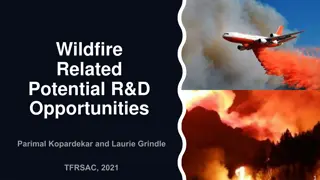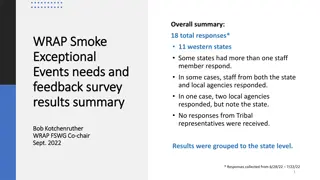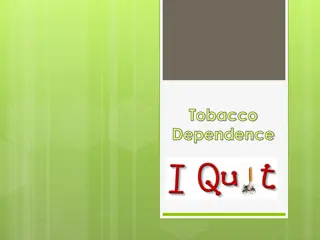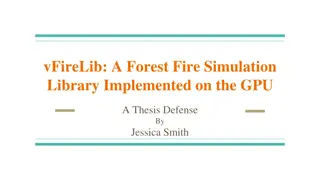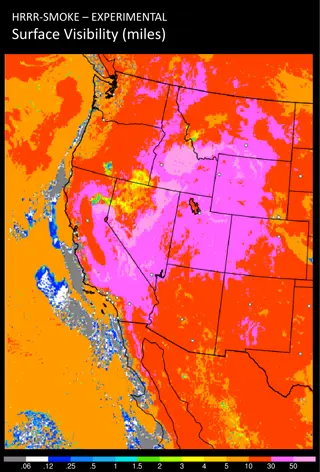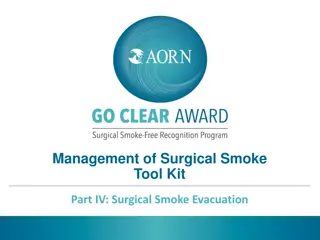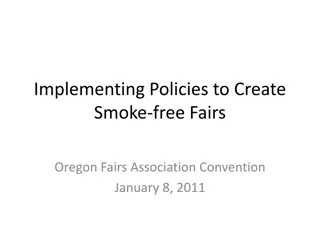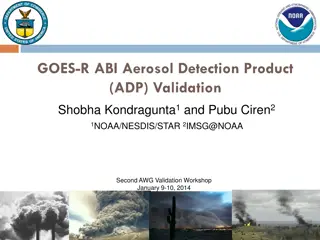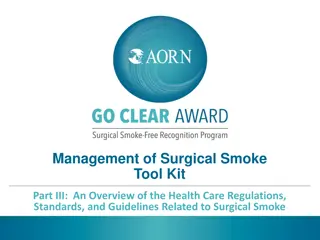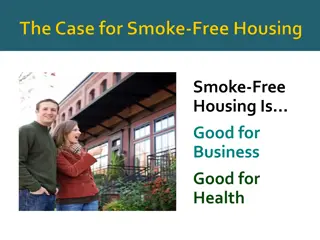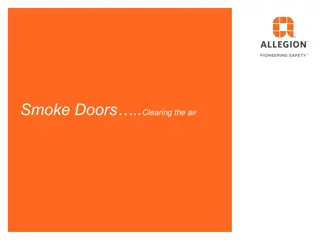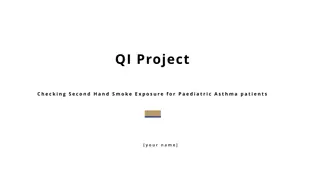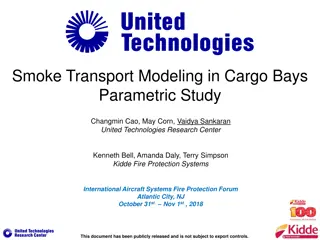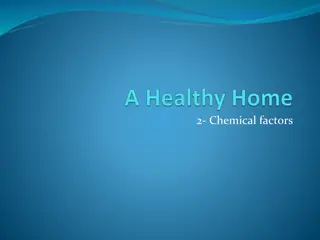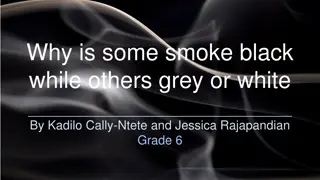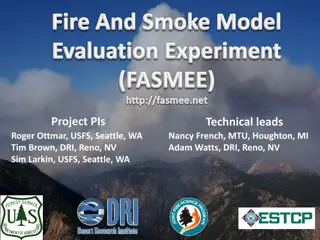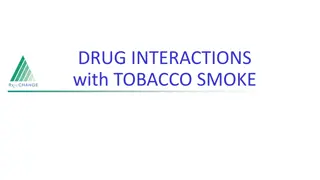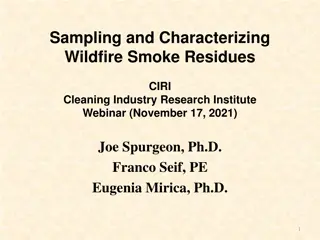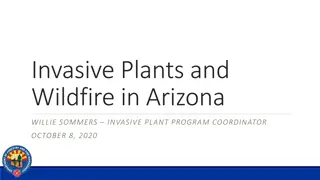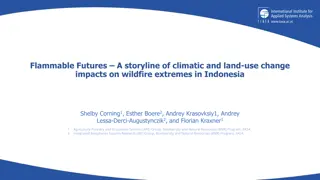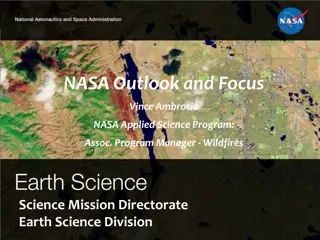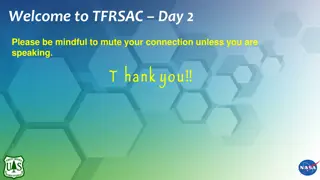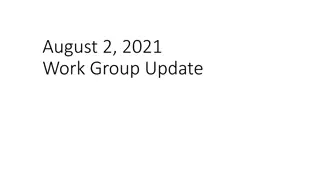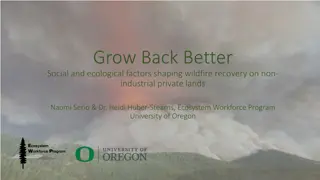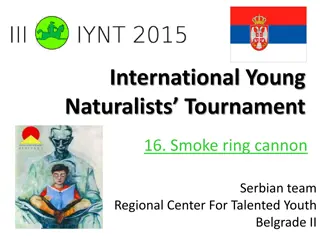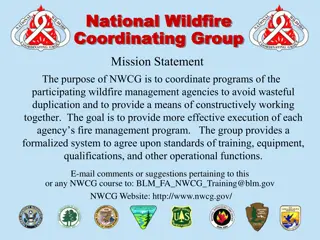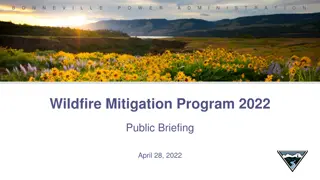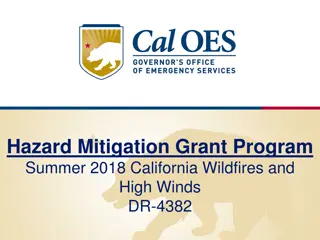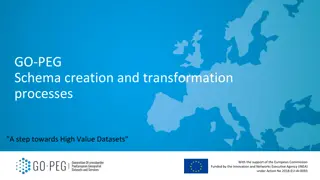About Fire and Smoke Damage Restoration Services
Fire and smoke damage cleanup is an arduous process that often requires the proper industrial equipment Work with MSI today for professiona services. \/\/ \/services\/fire-smoke-damage
8 views • 16 slides
Prescription Development and Scheduling in Wildfire Management
Explore the essential steps involved in developing prescriptions for prescribed fires, including identifying objectives, calculating fire behavior, and setting parameters. Learn about prescription variables, fire modeling outputs, and documentation requirements. Understand the importance of precise
0 views • 25 slides
Best Smoke shop in Metro Park
If you\u2019re looking for a Smoke shop in Metro Park, Then contact Paradise Vape and Smoke Shop. They aim to provide great service being that they are a family-owned small business. Call them anytime if you have any questions in regards to their products and the industry. You can rest assured that
0 views • 6 slides
National Wildfire Coordinating Group (NWCG) - S-200 Initial Attack Incident Commander Course Overview
NWCG aims to enhance coordination among wildfire management agencies to improve fire management program effectiveness. The S-200 course focuses on transitioning from Operations to Command roles, developing leadership skills, incident management, and evaluation techniques. Student evaluation includes
0 views • 12 slides
National Wildfire Coordinating Group - S-270 Basic Air Operations Course
NWCG's mission is to coordinate wildfire management agencies, avoid duplication, and enhance program effectiveness. The S-270 Basic Air Operations course aims to provide a foundational understanding of different aspects of Air Operations, including course logistics, objectives, and reference materia
0 views • 14 slides
Boreal Wildfire Effects and Research Synthesis
The thematic breakout report focuses on the impacts of fire and insect disturbances on the environment, with projects studying wildfires in boreal regions and their effects on ecosystems. Various studies funded by agencies like NASA and ERC aim to understand wildfire vulnerability, resiliency, and c
0 views • 10 slides
Fuego: AI-Based Wildfire Intelligence System Detecting Rapid Wildfire Behavior
Fuego, developed by Fuego Group UC Berkeley and Fireball, is a real-time AI-based system focusing on wildfire behavior in the Wildland-Urban Interface (WUI). The system detects wildfires early, surpassing predictions for 2080 severity. It emphasizes the impact on low-income communities, particularly
1 views • 11 slides
Best Smoke Alarms in Carrington
If you want the Best Smoke Alarms in Carrington, visit Barletta Electrical. They specialize in providing top-quality electrical services for residential and commercial properties. Whether you need installations, repairs, smoke alarms, or domestic mai
1 views • 6 slides
Analysis of Smoke Density and Toxicity in Various Transport Modes
This document presents an in-depth analysis of smoke density and toxicity in different transport modes, including maritime, railway, and aircraft. It covers classification documents, testing methods, hazard levels, and measured parameters for evaluating smoke density and toxicity levels. The synthes
0 views • 6 slides
Understanding Wildfire Risk Mitigation Among Private Landowners
Activities involving fuel reduction and defensible space are crucial among private landowners for mitigating wildfire risks. Factors influencing mitigation behavior include wildfire hazard, past experiences, perceived risk, and social context. Information from local government agencies and fire awar
3 views • 15 slides
National Wildfire Risk Assessment and Mitigation Strategies
The National Risk Assessment focuses on identifying and prioritizing hazardous fuels reduction projects to mitigate wildfire risks. Strategic objectives include developing a national risk model and tracking changes over time using a risk index based on national-scale datasets. Leveraging methods out
0 views • 20 slides
Wildfire R&D Related Opportunities and Statistics Overview
Comprehensive overview of wildfire-related research and development opportunities, outlining statistics on wildfire suppression costs, fire incidents, and acres affected. The content includes workshop goals, stakeholder needs assessment, and key challenges in the field. Insights from SME inputs, lit
0 views • 18 slides
Wildfire Smoke Exceptional Events Survey Summary
Survey results indicate that staff across various organizations in 11 Western states possess the expertise to develop wildfire smoke exceptional events demonstrations for particulate matter and ozone. The majority of states express readiness to assist other organizations and seek training to enhance
0 views • 17 slides
Understanding the Impact of Secondhand Smoke on Infants with Cystic Fibrosis
Studying infants with cystic fibrosis exposed to secondhand smoke revealed that those in smoke-free homes experienced better growth and lower risk of bacterial infections compared to those with smoking parents. Creating a quit plan for smokers is essential to improve health outcomes and prevent rela
2 views • 25 slides
vFireLib: Forest Fire Simulation Library on GPU
Dive into Jessica Smith's thesis defense on vFireLib, a forest fire simulation library implemented on the GPU. The research focuses on real-time GPU-based wildfire simulation for effective and safe wildfire suppression efforts, aiming to reduce costs and mitigate loss of habitat, property, and life.
0 views • 95 slides
HRRR Experimental Smoke Data Analysis
This content showcases experimental data from HRRR-SMOKE, focusing on surface visibility in miles and vertically integrated smoke levels in mg/m2. The images provide insights into the spatial distribution of smoke and visibility conditions, potentially useful for monitoring air quality and assessing
0 views • 4 slides
Comprehensive Guide to Surgical Smoke Evacuation in the Perioperative Setting
This detailed guide covers the essential aspects of surgical smoke evacuation in the perioperative setting. It includes information on smoke evacuator systems, evaluating smoke evacuators, critical features to consider, smoke capture methods, triple filter system, and the use of wall suction with in
0 views • 20 slides
Implementing Smoke-free Policies at Fairs: A Comprehensive Guide
Explore the step-by-step process of developing, implementing, and enforcing smoke-free policies at fairs. Learn from the experiences of other fairs, understand the importance of no smoking policies for health and the environment, and gain insights into addressing challenges and building partnerships
0 views • 25 slides
GOES-R ABI Aerosol Detection Product Validation Summary
The GOES-R ABI Aerosol Detection Product (ADP) Validation was conducted by Shobha Kondragunta and Pubu Ciren at the NOAA/NESDIS/STAR workshop in January 2014. The validation process involved testing and validating the ADP product using proxy data at various resolutions for detecting smoke, dust, and
1 views • 21 slides
Overview of Health Care Regulations and Standards for Surgical Smoke Management
This part of the surgical smoke management toolkit provides an overview of the health care regulations, standards, and guidelines related to surgical smoke. It covers various organizations such as AORN, ANSI, ECRI, IFPN, The Joint Commission, CDC, NIOSH, and OSHA, emphasizing the importance of contr
0 views • 17 slides
Benefits of Smoke-Free Housing in Colorado
Smoke-free housing in Colorado offers numerous advantages, including improving business outcomes, reducing health risks, lowering maintenance costs, and enhancing property values. By implementing smoke-free policies, property owners can protect residents' health, reduce fire risks, minimize cleaning
0 views • 30 slides
Understanding Smoke Doors and Clearing the Air in Building Regulations
Smoke doors can be confusing due to varying conditions, requirements, misinterpretations, and differentiating them from fire doors. This guide provides insights on classifying smoke doors, relevant documents, and tips for clarification.
0 views • 10 slides
Improving Pediatric Asthma Care Through Second-Hand Smoke Exposure Assessment
Data from GP practices in Wales indicate a low rate of discussing second-hand smoke exposure with pediatric asthma patients. This Quality Improvement (QI) project aims to ensure systematic identification and advice provision for patients exposed to second-hand smoke during asthma reviews. The propos
0 views • 6 slides
Parametric Study on Smoke Transport Modeling in Cargo Bays
Explore the parametric study conducted by researchers on smoke transport modeling in cargo bays. The study focuses on developing a model-based tool for designing cargo bay detection systems to streamline the certification process. Key components and motivations for characterizing smoke generators ar
0 views • 12 slides
Chemical Factors: Carbon Monoxide Poisoning and Smoking Risks
Chemical factors such as carbon monoxide poisoning from indoor sources like tobacco smoking and poorly ventilated appliances can lead to serious health risks. Recognizing the signs of CO poisoning, understanding the dangers of cigarette smoke, and addressing the addictive nature of smoking are cruci
0 views • 17 slides
Understanding the Differences in Smoke Colors - Exploring the Science behind Black, Grey, and White Smoke
Smoke color can vary based on what is being burned, the level of combustion, and various other factors. Black smoke often indicates incomplete combustion of heavy materials, while grey smoke signals the fire settling down. White smoke is common at the start of a fire or with lighter fuels. By studyi
0 views • 11 slides
Fire and Smoke Modeling Evaluation Effort (FASMEE) Overview
FASMEE is a collaborative project aimed at assessing and advancing fire and smoke modeling systems through critical measurement techniques and observational data. Led by key technical leads, FASMEE focuses on diverse modeling areas such as fire growth, effects, coupled fire-atmosphere behavior, smok
5 views • 30 slides
Interactions of Tobacco Smoke with Medications: Effects and Recommendations
Drug interactions with tobacco smoke can impact the pharmacokinetics and pharmacodynamics of various medications. Tobacco smoke constituents can induce enzymes that affect the metabolism of drugs, leading to altered therapeutic responses. For example, CYP1A2 enzyme induction by tobacco smoke can dec
0 views • 6 slides
Comparison of Wet-Wipe and Tape Lift Methods for Sampling Wildfire Smoke Residues
This research study compared the performance of wet-wipe and tape lift sampling methods for evaluating the impact of surface char from wildfire smoke residues. The study involved sampling 48 houses in Southern California affected by different wildfires, utilizing side-by-side replicate samples colle
0 views • 56 slides
Managing Invasive Plants and Wildfire in Arizona
The Invasive Plant Grant Program in Arizona is actively combating invasive plant species to prevent wildfires and preserve ecosystems. State funds are allocated for projects targeting species like Saltcedar and Buffelgrass. Grant criteria and projects in 2019 and 2020 reveal a focus on eradicating n
0 views • 19 slides
Impacts of Climate Change on Wildfire Extremes in Indonesia
A study explores the impacts of climatic and land-use changes on wildfire extremes in Indonesia, focusing on current and future climate-driven fires. The research examines the influence of factors such as drought, economic policies, and adaptation efforts on burned areas, agricultural losses, and la
0 views • 9 slides
NASA Wildfire Management Program Overview
NASA's Applied Science Program focuses on wildfire management efforts through the ROSES-2011.A.35 solicitation, aiming to enhance decision-making and actions related to wildland fires. The program supports research projects, collaborations with the fire community and sister agencies, and outreach ac
0 views • 11 slides
TFRSAC Day 2 Meeting Overview & Objectives
The 35th Tactical Fire Remote Sensing Advisory Committee (TFRSAC) meeting hosted by USDA Forest Service and NASA focuses on advancing wildland management practices and enhancing fire observation capabilities. The agenda includes sessions on AI/ML in support of wildfire management, wildfire decision
0 views • 6 slides
Environmental Work Group Updates - August 2021 Progress
Fire & Smoke, Oil & Gas, RTO, and WESTAR/WRAP work groups provided updates on their progress in various areas such as stakeholder workshops, data resource updates, modeling research, and ongoing meetings. The updates include discussions on wildfire smoke issues in tribal communities, refining work g
0 views • 5 slides
Exploring Social and Ecological Factors in Wildfire Recovery on Private Lands
This study delves into the social and ecological aspects influencing wildfire recovery on non-industrial private forest lands post the Labor Day fires. Focusing on NIPF landowners, the research aims to understand the factors shaping resilience and recovery at the landscape level, including the role
0 views • 12 slides
Constructing a Vortex Ring Cannon for Shooting Smoke Rings
Learn how to construct a vortex ring cannon that shoots smoke rings with sufficient distance to target the chairperson of your Science Fight. Materials required include a flowerpot, rubber bands, stretchable fabric, rope, drill, and jigsaw, along with substances like dry ice and water. Follow the st
0 views • 8 slides
National Wildfire Coordinating Group Mission Statement and Course Objectives
NWCG aims to coordinate wildfire management programs efficiently to enhance execution, avoiding duplication. The course objectives focus on understanding the structure of Expanded Dispatch and developing skills in mobilizing incident resources, effective communication, and fostering positive relatio
0 views • 13 slides
BPA Wildfire Mitigation Program 2022 Public Briefing Overview
The BPA Wildfire Mitigation Program 2022 Public Briefing, held on April 28, 2022, highlighted various aspects including the fire season outlook, wildfire mitigation plan, public safety power shutoff, and strategic management updates. The program aims to address wildfire risks in the BPA service terr
0 views • 18 slides
Mitigating California Wildfires: Hazard Mitigation Grant Program Overview
The Hazard Mitigation Grant Program (HMGP) aims to reduce loss of life and property from future disasters by implementing long-term risk reduction strategies. The program focuses on creating or updating Local Hazard Mitigation Plans, prioritizing post-wildfire mitigation activities, including soil s
0 views • 18 slides
Challenges in High-Value Datasets Creation and Transformation Processes
The creation and transformation process of high-value datasets, such as POP-WILDFIRE, face challenges like schema harmonisation, schema creation, and data transformation. Issues include identifying pan-European datasets, data pre-processing, aligning with INSPIRE directive, and adapting existing met
0 views • 6 slides

